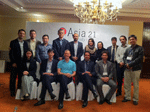The people must “fill the void as NATO draws down” from Afghanistan
Published on Thu, 2012-05-10 14:00
The NATO Summit to be held later this month in Chicago “is unusual compared to previous summits as it will not reaffirm the allocation of more resources to its mission in Afghanistan, but the alliance will seek how to withdraw from a leading combat role in an increasingly unpopular decadelong war,” remarked the Afghanistan Young Leaders Initiative in a position paper issued last week. “It is for the Afghans to take the necessary precautions and ownership to fill the void as NATO draws down from Afghanistan,” reads the statement issued by the Initiative, a non-partisan and non-political group of young people who share common values and beliefs to address the social, economic and political issues in the Asian country. United States President Barack Obama and NATO (North Atlantic Treaty Organization) Secretary General Anders Fogh Rasmussen agreed Wednesday that Afghanistan will be the main issue in the upcoming summit, to be held May 18 and 19 in Chicago. The Afghanistan Young Leaders Initiative “understands that Chicago will introduce a different narrative as no world leader is expected to announce an increase in its military and economic footprint in Afghanistan. Political and economic circumstances in the West, and in the US in particular, do not provide winning cards to NATO leaders to maintain the costly war for an unsustainable period.” “However, an accelerated drawdown will not only guarantee the failure of the mission for ‘winning hearts and minds’, but it could leave behind a country at risk of descending into another civil war as a possible post-2014 scenario,” warned the organization, which is aimed “to mobilize the youth for taking part in critical nation-building initiatives and advocate for positive changes in building a secure, safe and equitable society”. According to the paper, a expedite reduction of the Western presence “could translate into an increased regional rivalry for domination of Afghan politics” by nearby and remote neighbors. “There is an increasing perception that the Chicago Summit will determine the endgame for Afghanistan, which paves the way for internal and external actors to chart their short to long-term strategic interests in this country. It is for the Afghan government and the international community to provide a clear vision for both the Afghan people and their domestic constituencies for the post-2014 period in Afghanistan,” says the statement. The Afghan Young Leaders Initiative, established in 2011 in cooperation of Asia Society 21 Young Leaders program, forecasts that the success “could be ensured primarily through safeguarding our common achievements made in the past ten years, which has come through tremendous sacrifices of blood and treasure.” With the goals of preventing the country to become “a hub for international terrorism and regional rivalry,” the group recommended the summit the following steps: ■ “Sustainability of a properly equipped Afghan National Security Forces (ANSF) is a crucial element for lasting security, which is also an essential precondition for economic development.” ■ “Given that we live in unstable region, Afghanistan requires a military of an appropriate size, throughout the “transformation decade” (2015-2024). It should also be noted that a remarkable and sudden reduction in ANSF would leave a huge number of trained soldiers unemployed, which adds to our vulnerability to further ethnic and political tensions.” ■ “The growth of ANSF should be balanced between army and law enforcement agencies. Fighting an insurgency requires a stronger capability in the police and intelligence services; therefore, a greater emphasis is needed on police, as they would ultimately take on the role of ensuring the rule of law rather than fighting terrorists.” ■ “The NATO forces should continue their counter-terrorism mission in parallel to counter- insurgency efforts throughout the transformation decade. The counter-terrorism operations should not be limited to Afghan boundaries alone. The mandate of post-ISAF engagement should state that its counter-terrorism aspect is not limited to the Afghan boundaries. However, the issue of sanctuaries has to be handled before the US combat role is ended in Afghanistan in 2014. Targeting the leadership of Al Qaeda and the Taliban in their safe havens regardless of its geographical location through intelligence-driven operations has to be maintained with high momentum.” ■ “The upcoming 2014 Presidential election requires security arrangements, which in the immediate term seems beyond the capabilities of the ANSF unless the insurgency is quelled through a political settlement. Therefore, to ensure a free, fair and transparent election and also as a test case for the ANSF’s capabilities, the presence of international forces is essential to safeguard the election process. The impartiality and professionalism of the Afghan security forces should be ensured to avoid politicisation in the ranks of ANSF for the upcoming Presidential and Parliamentary elections.” ■ “The transition to a new Afghan administration after the 2014 Presidential elections should be considered as a key milestone to measure the success towards stability and political maturity beyond 2014.” The paper concludes that “the Afghan war is a war of perceptions for the most part. It is a multi-dimensional, complex, and regional conflict that requires a comprehensive, multi-pronged, and long-term commitment. It is of utmost urgency for both the Afghan government and the international community to ensure a successful outcome in Afghanistan, or we will continue to face the threat of terrorism and regional instability with grave consequences for world security and peace.” Source » |
SUSCRIBE TO OUR NEWSLETTER



